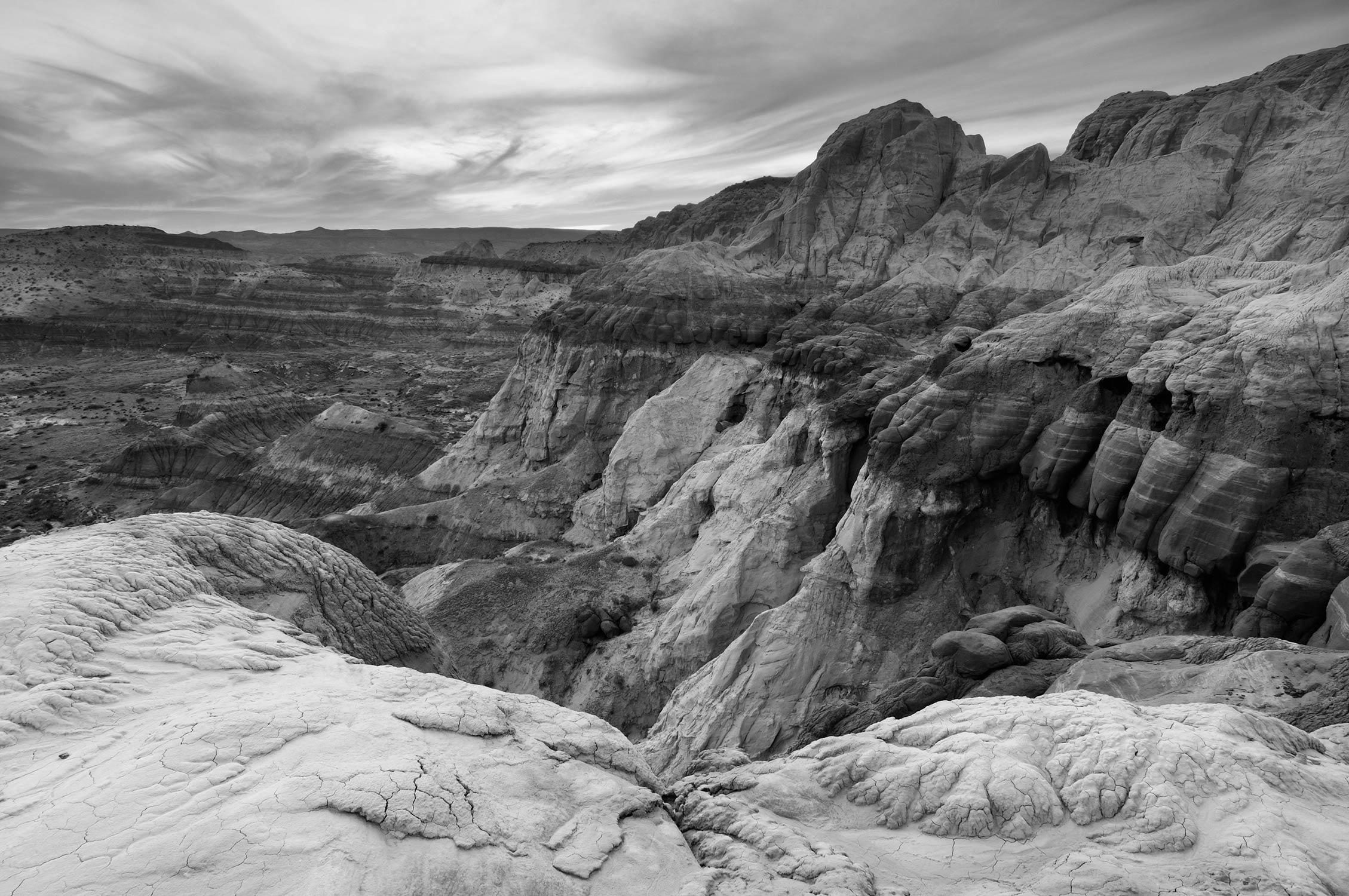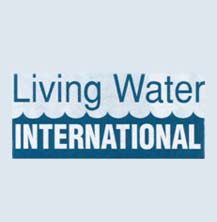
| Application | Water Well Drilling |
|---|---|
| Location | Kenya, Africa |
| Hammer | Numa 80 Hammer |
| Bit | Conventional |
| Hole Size | 8-1/2 inches (216 mm) |
| Depth or Length | Up to 1000 feet (305 m) |
| Formation | Varied |
| Rig Type | Jaswell 3500 |
Description
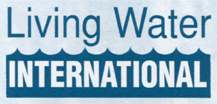 Living Water International (LWI) is a nonprofit organization that was created in 1990 by a group of caring businessmen who visited Kenya. After visiting, they were so overwhelmed at the need for clean water supplies that they formed an organization in order to provide safe water sources in developing countries that had little or no access to uncontaminated water. Many of us take for granted that we have a clean, safe water supply that is abundantly available to us. However, the fact is that some 80%
Living Water International (LWI) is a nonprofit organization that was created in 1990 by a group of caring businessmen who visited Kenya. After visiting, they were so overwhelmed at the need for clean water supplies that they formed an organization in order to provide safe water sources in developing countries that had little or no access to uncontaminated water. Many of us take for granted that we have a clean, safe water supply that is abundantly available to us. However, the fact is that some 80% 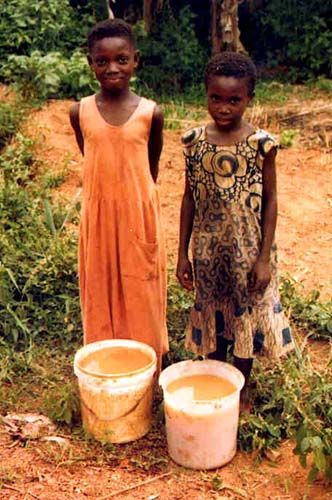 of the world does not have this luxury. In developing countries, collecting water can be an all-day process. Villagers will walk great distances to the nearest stream, which is usually polluted and disease ridden. This water is then poured into rusty and contaminated containers and carried or rolled back to the village. Overall, more than 1.6 billion people lack access to clean water.
of the world does not have this luxury. In developing countries, collecting water can be an all-day process. Villagers will walk great distances to the nearest stream, which is usually polluted and disease ridden. This water is then poured into rusty and contaminated containers and carried or rolled back to the village. Overall, more than 1.6 billion people lack access to clean water.
To accomplish their goal, LWI purchased a used Jaswell 3500 drill rig with a 900/350 air compressor on-board and sent it to Kenya to begin training staff to operate it. They also received significant contributions from Numa, a leading designer and manufacturer of down hole hammers and bits, in the form of Numa 80 down hole hammers and 8-1/2 inch (216 mm) bits. Much of the drilling on these projects was conducted by newly trained operators in extremely remote locations where replacement parts are hard to come by. The equipment being used had to continue to operate without incidence of failure in order for the projects to be completed in an acceptable amount of time. The products also needed to be user-friendly so new users could be easily trained on their use. The Numa hammers and bits were a perfect choice for this type of application due to their exceptional long life and ease of use.
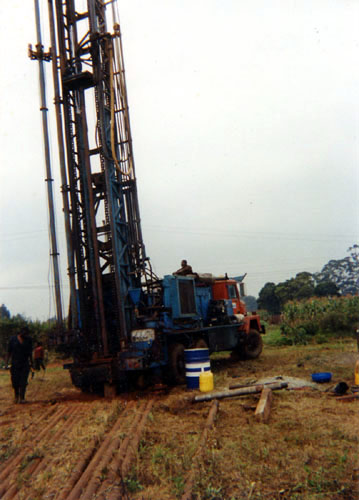 The Numa 80 is a simplified hammer design that was accomplished by eliminating several internal components and attaching the feed tube assembly within the backhead of the hammer. These changes promote much better alignment of all internal hammer parts resulting in longer hammer life, improved overall hammer performance and faster penetration rates. The simplified design also allows operators to easily change bits or air chokes when required.
The Numa 80 is a simplified hammer design that was accomplished by eliminating several internal components and attaching the feed tube assembly within the backhead of the hammer. These changes promote much better alignment of all internal hammer parts resulting in longer hammer life, improved overall hammer performance and faster penetration rates. The simplified design also allows operators to easily change bits or air chokes when required.
Specifications of the Numa 80 hammer include the capability of drilling holes 7-7/8″ to 10″ (200-254 mm) in diameter and an overall weight of just 442 lbs. (201 kg). The hammer boasts the ability to efficiently operate at pressures as low as 150 psi (10.2 bar) while also being able to deliver an impressive 1600 blows per minute at 350 psi (23.8 bar). Back pressure poses no problems as the Numa 80 drills efficiently against high heads of water. Typical horizontal and vertical applications include water wells, caissons, tie-backs, exploration holes, pile/rock sockets, tunneling under roads and other jobs where large volume of rock drilling is required.
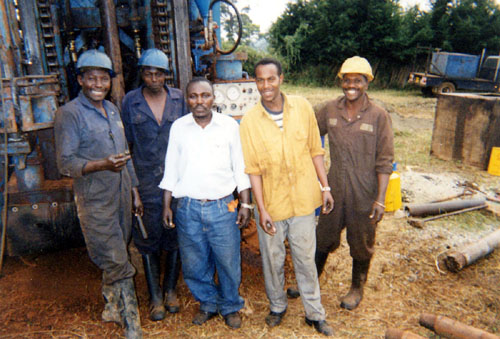 Over the past 11 years, Living Water has helped to improve the quality of life in many areas of the globe. In addition to Kenya, LWI now has operations in El Salvador, Ghana, Guatemala, Honduras, India, Panama and Peru. LWI also sponsors or participates in water projects in Angola, Haiti, Mexico, Mindanao, Myanmar, Nicaragua, Romania, Sudan, Tanzania and Uganda. Three (3) recently completed projects typify what Living Water’s compassionate service is all about.
Over the past 11 years, Living Water has helped to improve the quality of life in many areas of the globe. In addition to Kenya, LWI now has operations in El Salvador, Ghana, Guatemala, Honduras, India, Panama and Peru. LWI also sponsors or participates in water projects in Angola, Haiti, Mexico, Mindanao, Myanmar, Nicaragua, Romania, Sudan, Tanzania and Uganda. Three (3) recently completed projects typify what Living Water’s compassionate service is all about.
In Kenya, the Moe Girls School, located 10 miles northwest of Nairobi, relied upon a nearby river for all their water needs. This water was disease-ridden and caused many health problems. Since the school is in a very poor area, it could not afford a better water supply. Living Water heard of the school’s predicament and came to their aid. In a short amount of time, Living Water crews were able to drill two (2) water wells that were 940 feet (287 m) deep to provide the school with their very own clean and safe water supply. The introduction of clean water has resulted in much improved health of all school children and has increased school attendance.
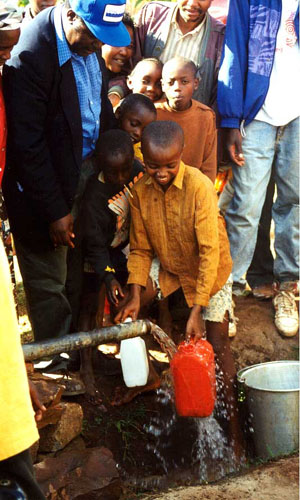 In another part of Kenya, a secondary public school in Ngong, a town 25 miles north of Nairobi, had a similar dilemma with a lack of an adequate water supply. For years, a local farmer and a municipal water system supplied the school with water but when a drought struck, everything changed. The farmer could no longer meet the demands of his farm and the school so he had to discontinue providing water to both. In addition, the municipal system could not keep up with demand and ultimately failed. Facing bankruptcy, the school received a tremendous boost from Living Water when they came to the school and drilled a deep water well that was able to provide a tremendous water flow. A fresh, clean water supply now met all the school’s needs and has even provided additional water they sell to others in the area. The money they receive from the water helps to subsidize children who cannot afford to attend school, which has resulted in a boost in attendance. Furthermore, the water supply has made the school profitable, which has allowed them to reinvest in many academic areas and provide more for their students. The school now boasts a new science department and sends every child home each day with one (1) gallon of fresh, clean water for their families to have.
In another part of Kenya, a secondary public school in Ngong, a town 25 miles north of Nairobi, had a similar dilemma with a lack of an adequate water supply. For years, a local farmer and a municipal water system supplied the school with water but when a drought struck, everything changed. The farmer could no longer meet the demands of his farm and the school so he had to discontinue providing water to both. In addition, the municipal system could not keep up with demand and ultimately failed. Facing bankruptcy, the school received a tremendous boost from Living Water when they came to the school and drilled a deep water well that was able to provide a tremendous water flow. A fresh, clean water supply now met all the school’s needs and has even provided additional water they sell to others in the area. The money they receive from the water helps to subsidize children who cannot afford to attend school, which has resulted in a boost in attendance. Furthermore, the water supply has made the school profitable, which has allowed them to reinvest in many academic areas and provide more for their students. The school now boasts a new science department and sends every child home each day with one (1) gallon of fresh, clean water for their families to have.
A third success story comes from a government hospital 100 miles (161 km) outside of Narobi in Navasha. For five (5) years, the hospital had no designated water supply. Patients had to bring in their own water for surgery, cooking, bathing and cleaning of wounds. As you can imagine, the water that was usually brought in came from many different sources and was never very clean. Risk of infection and waterborne illness was rampant. Living Water was able to help as they arranged for the drilling of a 600 foot (183 m) water well. The hospital now has their own dedicated, clean water supply that can be used for all their patients. The water supply is so abundant that they sell some of it to others in the area in order to help them buy supplies, which helps to better serve their community.
These are just a small sampling of the overwhelming number of projects that Living Water has completed. All across the world, communities in need of clean water have felt LWI’s compassion. Through the help of caring organizations like Living Water International and Numa, the world can become a better place. If you would like to help Living Water and Numa provide clean water in developing nations around the world, contact Gary Evans President of Living Water in Sugarland Texas at 281-261-7984 or visit their website at www.living-water.org. All monetary and in-kind contributions to LWI are tax-deductible as allowed by law.
Get to the bottom of it with Numa.


